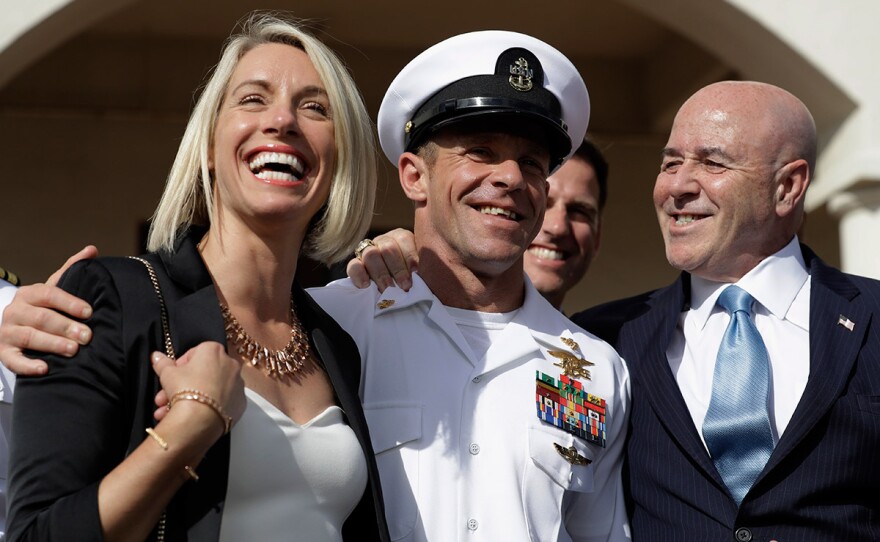During the weeks-long trial of SEAL Edward Gallagher this summer, the legal arm of the U.S. Navy — the Judge Advocate General’s office — took a beating. A very public beating.
Outside the courtroom, the prosecution’s perceived missteps were fodder for Gallagher’s attorney, Marc Mukasey.
“I think today you saw what not to do if you want to have a criminal investigation done with integrity,” Mukasey said as he railed against the investigation. “You saw sloppiness. You saw shoddiness. You saw negligence.”
When summer began, six SEALs were set to go on trial in San Diego for war crimes. By the end of the summer, the Navy dismissed five of those cases stemming from two separate incidents. In the highest-profile case, Gallagher, accused of war crimes for shooting Iraqi civilians and killing a captive enemy fighter, was acquitted of the most serious charges.
Christopher Chaplack, the lead prosecutor in the Gallagher case, was removed by the judge over allegations of spying on the defense. He had placed electronic trackers into emails sent to the defense to try to identify the source of media leaks.
RELATED: Navy Upholds Sentencing Of Navy SEAL For Posing With Corpse
On the stand, medic Corey Scott, a prosecution witness, announced that he was the one who killed the wounded man in their custody in Iraq in 2017. Scott testified that he saw Gallagher stab the prisoner, but then Scott said he closed the prisoner’s breathing tube after Gallagher walked away. The embarrassing revelation came after prosecutors granted Scott immunity for his testimony.
Gallagher’s supporters made the rounds on local and conservative media, including Fox News. President Trump tweeted support for Gallagher both before and after the trial.
The Navy is now searching for the root cause the missteps. In August, Navy Secretary Richard Spencer ordered a review of the Navy and Marine Judge Advocate General program, looking at everything from how JAGs are trained to the number of people the Navy has to try cases.
Reform won’t be easy. Lt. Jessica Woo, a Judge Advocate General attorney in San Diego, noted that JAG does much more than conduct courts martial. During her career, Woo has helped sailors write wills, but she hasn’t spent a great deal of time in a courtroom. At the moment, she’s instructing Navy and Marine officers in how to apply military law.
“Because there are not enough judge advocates and paralegals, we need legal officers who are surface warfare officers, submarine officers, aviators, who are providing administrative disciplinary advice to their commanding officers,” she said.
One key feature of military justice is that a commander makes the decision about who goes to trial, rather than a prosecutor or a judge. The convening authority can also overturn a conviction. That raises the potential for bias, says David Schlueter. The former Army JAG officer now teaches military law at St. Mary's University in San Antonio, Texas.
“As one court said years ago, undue command influence is the mortal enemy of military justice,” Schlueter said. “And it’s difficult to root out because even the most well intentioned commanders can unintentionally signal to a subordinate that they’re looking for a particular result.”
RELATED: Jury Finds Navy SEAL Not Guilty Of Murdering Islamic State Prisoner
Trump’s involvement put the independence of military justice in question, said Rachel VanLandingham, a professor at Southwestern Law School in Los Angeles. She said President Trump was looking for a particular result when he tweeted about Eddie Gallagher.
“Tweeting publicly, therefore sending signals down the ranks of his commanders — ah, if you do something in this military justice field that I don’t like, I’m going to be publicly shaming you — I mean, that’s really dangerous,” said VanLandingham, who is a former Air Force JAG lieutenant colonel.
Part of the solution may be taking some cases out of the Navy’s hands, she said.
While the Gallagher war crimes trial was going on in San Diego, a few miles away, federal prosecutors were six years into trying one of the largest scandals in Navy history. That prosecution has been quietly effective.
A Malaysian contractor, Glenn Francis, dubbed Fat Leonard, bribed high-ranking Navy leaders with trips, dinners and prostitutes, leading to a string of federal indictments and 22 guilty pleas.
Congress has debated whether to move military cases involving sexual assault into federal court. Commanders and the military have long struggled with how to handle sexual assault allegations. Rep. Jackie Speier, D-Calif., has sponsored a bill to move all of those cases to the federal court.
Using federal court may be the solution for certain cases, like sexual assault, VanLandingham said. If nothing else, such a move would take some of the load off of the military justice system. But war crimes are different, she said.
“Most commanders realize that if there is a credible allegation of a war crime against a person in their unit, if they don’t take appropriate action, there goes their mission.”
Congress has moved to limit the role of commanders in military court under a revision of the Uniform Code of Military Justice that went into effect this year.
Schleuter says the Navy needs to restore confidence in JAG.
“You have to avoid even the appearance of evil,” he said. “So when I talk to young JAGs, I talk to them about, be sure when they contribute to the military justice system that (they remember) the world is watching. And they shouldn’t cut corners. They shouldn’t even think about taking actions that might later reflect poorly not only on them, but on the system itself.”
The result of the Secretary of the Navy’s review of the JAG programs is expected later this year. Tuesday, the Chief of Naval Operations upheld Gallagher’s sentence on his one remaining charge. He had asked that his four-month sentence be thrown out.







